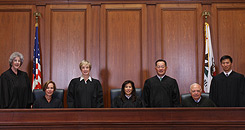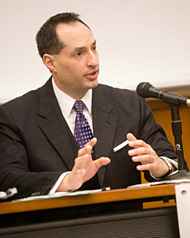
By Leslie A. Gordon
To experience a “Who’s Who of California constitutional law and California Supreme Court thinkers and watchers,” there’s no better place to be than the International House auditorium on October 4, said David A. Carrillo, executive director of Berkeley Law’s California Constitution Center. That’s the day that legal luminaries will gather for the law school’s second Conference on the Supreme Court of California.
Back when he was a student in Berkeley Law’s LL.M. program, Carrillo had what he describes as “a very tiny idea”—to create a forum where scholars and practitioners could come together to study the state’s high court and constitution. “Many people study the federal constitution and the U.S. Supreme Court, but I thought, ‘No one has done this for California—so why shouldn’t we?’” Carrillo recalled.
California is the nation’s most populous state and has one of the world’s largest economies. State courts handle the vast majority of legal cases, yet, as Carrillo noted, they aren’t studied as rigorously as the federal courts. “I thought that by coming together as a profession, we could gain perspective on our state institutions, rather than studying in isolation.”
The inaugural conference
Led by Professors Jesse Choper and John Yoo, and in cooperation with the state Supreme Court, Carrillo helped produce Berkeley Law’s inaugural conference in 2008. The event sought to raise awareness and understanding of the court’s work, identify important legal developments, and encourage further study.
Justices of the court and notable legal heavyweights like former Governor Pete Wilson ‘62, former California Attorney General John Van de Kamp, and Pepperdine University School of Law Dean Kenneth Starr participated as panelists in 2008. Topics included the separation of powers, the politicization of judicial campaigns, and same-sex marriage.
The one-day conference was so well-received that the court subsequently held one of its special oral argument sessions at Berkeley Law in 2009.
According to Professor Choper, fellow scholars of California’s legal institutions were “very pleased” with the conference, which “filled a void” in the academic community.

Carrillo, who later earned a doctorate from Berkeley Law, quipped, “To paraphrase the late Paul Newman [describing the origin of his Newman’s Own product line], ‘It started with the popcorn and then got out of control.’ The original idea grew into the 2008 conference, the 2009 special session, the creation of a research center, and now another conference and special session of the court.”
Indeed, the success of the first conference led Carrillo and his colleagues to believe that there was “an untapped market” for studying the state’s constitution and high court in an “organized, institutional way.” “It kept evolving,” he explained, “and we just kept scaling up to meet the need.”
A focus on the high court
Last year, Carrillo was named the founding executive director of the new California Constitution Center, an institution that grew out of the conference. It’s the first and only center at any law school devoted exclusively to studying the constitution and high court of California. The center engages research fellows, offers seminars and scholarly events, and produces articles on the state constitution.
Since the center’s launch, Carrillo has been busy planning the second conference, which will be held in partnership with the Constitutional Rights Foundation, the Institute of Governmental Studies, the American Constitution Society, and the Federalist Society.
Offering six hours of MCLE credit, the conference will gather a mix of academics, students, practitioners, staff attorneys, certified appellate specialists and “anyone else who cares about the judicial branch from a policy perspective,” said Carrillo. The conference will explore not only substantive legal issues, but also the court’s institutional challenges.
“This conference is the only one of its kind,” Carrillo said. “We’ll have a high-level discussion on some very big issues. If anyone wants to learn about critical state constitutional matters and the state judiciary, there’s no other comparable event.”
Relocated from Clark Kerr to the International House auditorium for its proximity to the law school and to accommodate more attendees, the event will feature a morning salon-style conversation with Chief Justice Tani Cantil-Sakauye and an afternoon talk with Justice Kathryn M. Werdegar ‘62. In-depth panel discussions will cover major recent state high court decisions; the impact of capital cases on its docket; and practice and procedure at the court.
Following the conference, on October 9, the court will hold a special session in Berkeley Law’s Booth Auditorium. This is part of a regular outreach program that reflects the court’s commitment to giving the public an opportunity to experience its work firsthand, while offering students a forum to learn from the state judicial process. The event will be broadcast live on the California Channel, enabling anyone to watch the state high court in action. Before arguments begin, selected student questions will be posed to the justices.